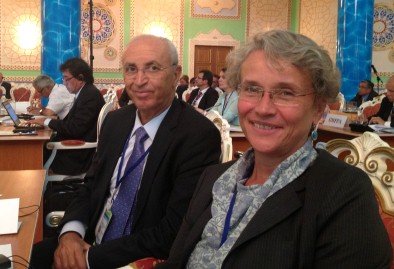Speaking at the conference, Dr. Grobicki delivered a GWP statement that said the trouble with water is that it is more politics than economics – it needs high level political commitment to make real progress.
“Rethinking water as an opportunity, rather than a problem, is not only necessary but this conference provides us with an historic moment in which to do this. The nations of the world decided at the Rio+20 conference in 2013 that a set of Sustainable Development Goals would be established. SDG on water would ensure the political will and political attention through until 2030. Water issues would at last get the visionary that they deserve,” said Dr. Grobicki.
Dr. Mohamed Ait-Kadi, Chair of the GWP Technical Committee, said there is still a lot of work to be done to achieve this:
“There is still vast, unexploited scope to promote cooperation and solidarity in the pursuit of common goals. Much is intellectually and technically within our grasp. What is often missing is the will and the skill to global and regional cooperation.”
Professor Patricia Wouters, Member of the GWP Technical Committee, pointed out that the duty to cooperate is the bedrock of international law and requires states to cooperate in the management of their transboundary water resources.
“Let us remember this and reinforce the important role that international law plays in facilitating transboundary cooperation. GWP has an important role to play in capturing, developing and sharing practice in transboundary water cooperation across its network, including the contribution of legal frameworks, such as those concluded under the auspices of the UN and at regional levels”, said Professor Wouters.
IWRM Approach to Climate Change
GWP CACENA organised a side event during the conference, “IWRM as a Practical Approach for Adaptation to Climate Change in the Countries of Central Asia and Caucasus”.
Participants reviewed the planned activities of the GWP Water and Climate Programme to be implemented in Caucasus and Central Asia. The impacts of climate change were discussed, as well as related adaptation measures linked to water management.
It was concluded that practical solutions on the local level are needed, mainly in irrigation, water supply and sanitation – supported by capacity building and community engagement.
Photo: Dr. Mohamed Ait-Kadi and Dr. Ania Grobicki at the conference in Dushanbe.

